Christ is risen! Truly He is risen!
Some Bible commentaries say that Saint 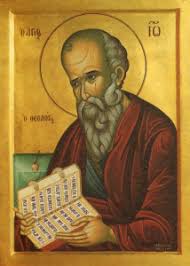 John the Evangelist portrayed the Apostle Thomas as “the clueless one”, a shallow skeptic, and otherwise sought to “discredit” him. Really? I don’t think so! From what I read in John’s Gospel, I admire Thomas immensely, and I think John did too.
John the Evangelist portrayed the Apostle Thomas as “the clueless one”, a shallow skeptic, and otherwise sought to “discredit” him. Really? I don’t think so! From what I read in John’s Gospel, I admire Thomas immensely, and I think John did too.
Remember that John needed to keep his Gospel account short, compact enough to be carried around easily – and there were no books in those days, let alone the internet as perhaps you already knew? Also, for practical purposes, it needed to be short enough that people would actually read it. So John omitted much, even about Jesus. At the end he (or a later editor) wrote: “Jesus did many other things as well. If every one of them were written down, I suppose that even the whole world would not have room for the books that would be written.” John 21:25 I just hate that line! I want to know all those “many other things”. I hope we’ll hear them in Heaven.
Saint Thomas the Apostle
So John told us nothing about Thomas’ background, and otherwise only that he was called “Didymos”, Δίδυμος, “the twin”. But he did include two “pre-Resurrection” stories about him, carefully chosen to show his character.
1 Thomas wanted to know the truth. Before His death, Christ told the Apostles He was about to leave them, “and you know where I am going”. Thomas didn’t understand and quickly asked, “Lord, we don’t know where you are going, so how can we know the way?” That was when Christ answered, “I am the way and the truth and the life.” John 14:4-6 Surely this left a deep impression on Thomas.
2 Before the Crucifixion, Thomas had believed in Jesus totally, without hesitation. John wrote that when Christ announced He was going to Bethany to raise Lazarus (two miles from Jerusalem, and therefore into mortal danger) Thomas again spoke up quickly, courageously: “Thomas said to the rest of the disciples, ‘Let us also go, that we may die with him.'” John 11:16
Pascha Night
You know this story well: On Pascha night, the risen Christ 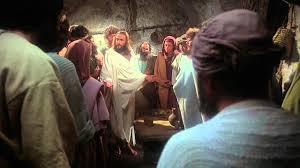 appeared to the Apostles in the Upper Room, but “Thomas… was not with them when Jesus came. ” (I’ve always wondered where he was and what he was doing. They were afraid, hiding. Maybe had Thomas bravely gone out to get food? It sounds like him. But obviously he had not abandoned them, since we know he was still there the next Sunday.) When the other disciples told him, “We have seen the Lord!” Thomas said to them, “Unless I see the nail marks in his hands and put my finger where the nails were, and put my hand into his side, I will not believe.”John 20:24-25
appeared to the Apostles in the Upper Room, but “Thomas… was not with them when Jesus came. ” (I’ve always wondered where he was and what he was doing. They were afraid, hiding. Maybe had Thomas bravely gone out to get food? It sounds like him. But obviously he had not abandoned them, since we know he was still there the next Sunday.) When the other disciples told him, “We have seen the Lord!” Thomas said to them, “Unless I see the nail marks in his hands and put my finger where the nails were, and put my hand into his side, I will not believe.”John 20:24-25
Why ever did Thomas react so strongly? John didn’t say. For myself, I think it is the natural emotional reaction of anyone who has deeply loved anyone or anything, but then has “loved and lost”, as we say. At first they are so hurt they cannot bear even the thought of giving their hearts and souls again.
Nor did John tell us what happened with Thomas during the following week, but certainly… Well, try to imagine this with someone “less apostolic” and therefore easier to think about: Someone’s mother, the person he loved more than anyone else in the world, has died. He saw her dead and buried, and was now in a state of deep grief. Then suddenly his brothers and sisters tell him “Mom is alive! We saw her! We had supper with her!” The man would have many reactions. First of all total shock. Then so many questions: What is going on here?! People do not rise from the dead! This couldn’t happen! So is my family lying about this? Are they “up to” something? But what? and why? I’ve known them, loved, them, trusted them – that wouldn’t be at all like them. So was there some kind of awful mistake? Was it somehow not mother who died? But I saw her dead. I’m sure it was her. It would overwhelm this man, make it almost impossible to think. “But one thing I know: I cannot handle having my hopes raised and then dashed again, and begin this horrible grieving all over again, only now twice as bad. So unless I see her for myself, I will not believe it.”
Now, Thomas surely must have suffered the same kind of inner turmoil. But this was even worse than losing mother. Thomas had been so sure Jesus was the Messiah, the Savior of the world, and His death had nearly destroyed him. He was not about to believe that again till he saw for himself. That is no reason to brand Thomas as a shallow clueless intellectual skeptic. Nor do I think the Apostle John saw him that way.
No matter, this is how Thomas gained his nickname, which he has not been able to shed all these centuries: “Doubting Thomas”. That is not fair! He should be called “Believing Thomas”, for only a week later he was the first person to proclaim clearly, courageously, precisely the truth about Jesus Christ, which the Church has proclaimed ever after.
“A week later His disciples were in the house again, and Thomas was with them. Though the doors were locked, Jesus came and stood among them and said, ‘Peace be with you!’ 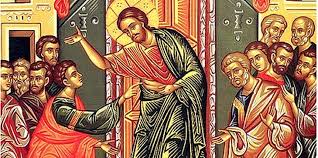 Then He said to Thomas, ‘Put your finger here; see my hands. Reach out your hand and put it into my side. Stop doubting and believe.’ Thomas said to him, ‘My Lord and my God!’ Then Jesus told him, ‘Because you have seen me, you have believed. Blessed [happy] are those who have not seen and yet have believed.'” John 26-29
Then He said to Thomas, ‘Put your finger here; see my hands. Reach out your hand and put it into my side. Stop doubting and believe.’ Thomas said to him, ‘My Lord and my God!’ Then Jesus told him, ‘Because you have seen me, you have believed. Blessed [happy] are those who have not seen and yet have believed.'” John 26-29
That last sentence was meant for us, of course. How can those who have not seen come to believe?
Seeking the Truth about Religion
This has always been the problem, at least for those who truly want to know. (Many just follow the way they were raised, whatever it is, and don’t look farther.) In the early centuries: should people turn to Christ or continue worshiping idols? Then it was what about the Gnostics and the “spurious Gospels”, as we now call them. Arius was a powerfully convincing charismatic leader who knew how to promote himself and his ideas. He even had little groups who traveled around singing “there was a time when Christ was not”. How could people know whether to believe him or the Church? It goes on and on. Muhammed or Jesus? the Pope or Martin Luther? – each of whom taught that the other was the Anti-Christ! In modern times it’s far worse, with new denominations and faiths and dynamic preachers popping up every ten minutes, teaching many different, often completely opposite, things. Who to believe? How to know?
Fifty years ago while I was in college, a charismatic preacher (speaking in tongues and all that) arrived in my home town back in Ohio, started a 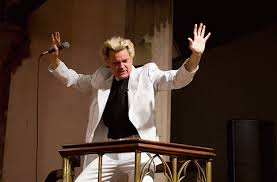 new “church” and drew huge crowds, almost emptying out the other churches. People gave their hearts and souls and money to this guy, and soon he had himself a new church building with a big parking lot filled with cars two or three times a week. I drove past and saw it. On a trip back to see my parents not many years later, out of curiosity I drove by again. The building was abandoned, high grass growing all around it, the parking lot empty – and the preacher had left town. A false shepherd. Some folks, I was told, were totally disillusioned and gave up on religion. Others went back to their churches, humiliated, ashamed, embarrassed. Could they have saved themselves from this?
new “church” and drew huge crowds, almost emptying out the other churches. People gave their hearts and souls and money to this guy, and soon he had himself a new church building with a big parking lot filled with cars two or three times a week. I drove past and saw it. On a trip back to see my parents not many years later, out of curiosity I drove by again. The building was abandoned, high grass growing all around it, the parking lot empty – and the preacher had left town. A false shepherd. Some folks, I was told, were totally disillusioned and gave up on religion. Others went back to their churches, humiliated, ashamed, embarrassed. Could they have saved themselves from this?
Maybe if they had taken some lessons from the Apostle Thomas.
1 “Look before you leap.” Don’t give yourself to anyone, anything quickly. * I know a young woman who joined the  Mormons because they seemed to preach Jesus Christ (and they do in their unorthodox way) and the people were nice (which they are, extremely). But then, since she is bright and thoughtful, she began to research Mormon history and theology, and whoops! She is now an Orthodox catechumen, and is taking her time.
Mormons because they seemed to preach Jesus Christ (and they do in their unorthodox way) and the people were nice (which they are, extremely). But then, since she is bright and thoughtful, she began to research Mormon history and theology, and whoops! She is now an Orthodox catechumen, and is taking her time.
- I should talk. I was engaged within three months and married six months later to the most wonderful woman in the cosmos. But I was lucky. Blessed. Young people: do not follow my example!
2 Ask. Think. (And as I’ve said, if any group wants you to leave your mind at the door,  do not go in.) Does it hang together? Is it likely to be true? Might this leader, this group be chiefly in it “for themselves”? Is it an ego trip or are they true servants? Have these people shown themselves to be trustworthy in the past? have you even known them? heard of them? Think. My father often warned me, “Don’t just be one of the sheep.” But I would now add, “unless you discover the flock that is following the Good Shepherd.”
do not go in.) Does it hang together? Is it likely to be true? Might this leader, this group be chiefly in it “for themselves”? Is it an ego trip or are they true servants? Have these people shown themselves to be trustworthy in the past? have you even known them? heard of them? Think. My father often warned me, “Don’t just be one of the sheep.” But I would now add, “unless you discover the flock that is following the Good Shepherd.”
3 And then wait till you “see for yourself”, know for yourself. How long will that take? I don’t know. In some cases it doesn’t take long. In other cases it’s longer, sometimes much longer. Don’t hurry.
For we have a promise about this: If you are truly seeking God, seeking the truth, it will be shown to you. “Ask, and it will be given to you; seek, and you will find; knock, and it will be opened to you. For everyone who 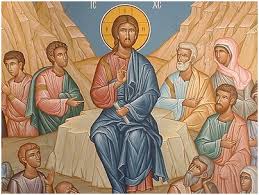 asks receives, and he who seeks finds, and to him who knocks it will be opened. For what man is there among you who, when his son asks for a loaf, will give him a stone? Or if he asks for a fish, he will not give him a snake, will he? If you then, being evil, know how to give good gifts to your children, how much more will your Father who is in heaven give what is good to those who ask Him!” Matthew 7:7-11
asks receives, and he who seeks finds, and to him who knocks it will be opened. For what man is there among you who, when his son asks for a loaf, will give him a stone? Or if he asks for a fish, he will not give him a snake, will he? If you then, being evil, know how to give good gifts to your children, how much more will your Father who is in heaven give what is good to those who ask Him!” Matthew 7:7-11
4 And when you finally find it – no, find Him, for He is at the end of all searching * and are sure: you must give yourself to Him with all you have.
- See second Post Script below.
After Thomas had “seen for himself”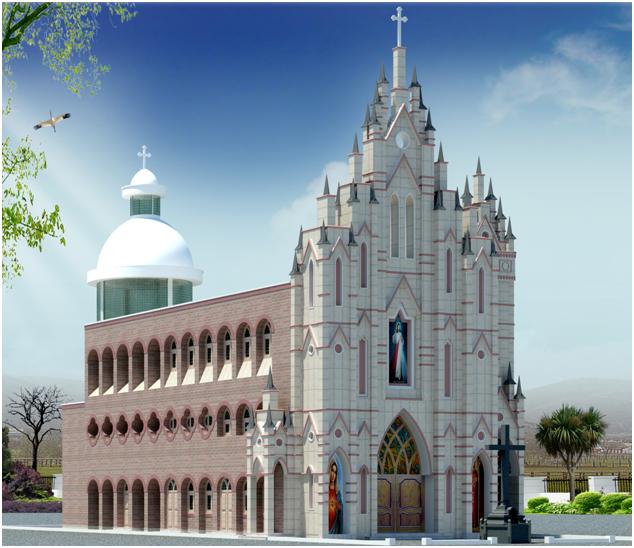
Here too follow the Apostle Thomas. His work is not recorded in the Book of Acts, because that only tells some of what happened in the northern Mediterranean region. The Christians of India know about the rest of Thomas’ life, that he brought 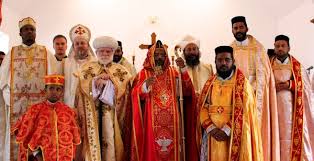 Christianity to India – the Church of Mar Thoma. Above: Mar Gregorios Indian Orthodox Church, West Delhi Here is the website for the Orthodox Church of India: https://mosc.in
Christianity to India – the Church of Mar Thoma. Above: Mar Gregorios Indian Orthodox Church, West Delhi Here is the website for the Orthodox Church of India: https://mosc.in
This an interesting account : https://aleteia.org/2018/05/18/the-little-known-story-of-how-st-thomas-the-apostle-brought-christianity-to-india/ There is much more about Indian Orthodoxy online.
This is Divine Liturgy (Holy Qurbana, ܩܘܪܒܢܐ ܩܕܝܫܐ) at Saint Basil Indian Orthodox Church in New York City. The consecration of the Holy Gifts (which is very interesting) begins just before l:00.
Thomas apparently also proclaimed the Gospel in Ethiopia on his way to India, and there is an Indian tradition that he traveled as far as China! But Indian Christians say he was martyred in Myalpur, near Madras, in AD 72.
Once Thomas saw the risen Christ, the One who is “the way and the truth and the life”, he gave his heart and soul to Him for the rest of his life.
Two Post Scripts.
1 I’m tempted to take a side trip here into poliltics. Let’s not go there. Except to say that here too, learn from Thomas. Look before you leap. Don’t believe just because “everybody says so”. Remember, Jesus said: “The devil… is a liar and the father of lies.” John 8:44 With a little effort it’s not hard to discover whether “fake facts” and “alternative facts” are actual facts or not. “The lips of truth shall be established for ever: but a lying tongue is but for a moment.'” Proverbs 12:19
2 This is much more important. There are many ways of seeking the truth and all of them, followed far enough, lead to God. For example, my background in science (B.S. Meteorology, 1960, University of Wisconsin, Madison) led me directly to God. It started in a Chemistry class, where the professor kept emphasizing that all scientific laws lead back to E=mc2. After class I went up and asked: But why does E=mc2? He gave me an odd look and said “It just does”, and quickly turned away. I went home thinking “But…but…but… there must be a better answer than that!” And there is One. Anyone who is sincerely seeking truth cannot study science or music or art or mathematics or law or medicine or society or anything without finally wondering: Why is it as it is? Who designed it that way? Who orders it? What “propels” it? All search for truth, if followed far enough, leads to the Source. The trouble is that some people don’t follow far enough or don’t ask the obvious questions or have a closed mind. For there is only one Source of Truth. Christ took His last words on the Cross from Psalm 31:5: “‘Into Your hands I commit my spirit’, for You have redeemed me, O Lord, God of truth.”
Next Week: Third Sunday of Pascha – The Myrrhbearing Women
Week after Next: Fourth Sunday of Pascha – The Paralytic
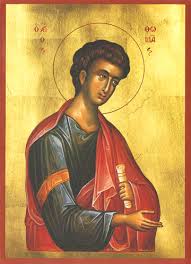
Thank you, Father, for the Indian Orthodox liturgy, which was fascinating, and the sermon at the end (by a deacon, I surmise), on the St Joseph the Betrothed, was quite good.
Uh oh. I hate to confess that I never listened that far. I’ll go back and hear it. Thank you!
Thank you Father for your lovely blog. As a regular reader, this Indian Orthodox Christian’s heart was especially gladdened by this article. St.Thomas (pray for us) is very special to us and we consider him ‘Indiayude kaval pithavu’ or ‘India’s guardian Father’
And thank you. God bless you. May Saint Thomas pray for you.
P.S. Are you writing from India or the U.S. or…?
Thank you Father for acknowledging my post . God bless you!
I am writing from Kerala, a state in the southern most tip of India. Its a lovely place [you will find it as lovely as Greece ;)] as is popularly known as God’s own country. It is to Kerala that St.Thomas came and first converted the Christians. Kerala is rich in spices and has had trade relations (via the sea) with the Middle East (and China and Far East too) from time immemorial and there has always been a Jewish colony in Kerala. So I guess it was quite natural for St.Thomas to make his way here.
I just looked up some images of Kerala. Yes, it is lovely indeed. I plan to research and learn more.
I hope you all are protecting yourselves from the Virus and staying safe.
Father Bill
Dear Fr Bill, you have an interesting history. No matter what our excursions, centering ( rooting in Christ) in Christ is the key. Then all that we speak and do is blessed. I am from the Indian Orthodox Christian Church ( one of the surviving family/ member of the original survivors of the Portuguese holocaust of the Indian Orthodox Christians in the 15th century) established by St Thomas in CE 52 and it is wonderful that people are discovering it. That includes other Orthodox Christian Churches including the Greek. After that ; between the 18th and 20th century picked to pieces by the Church of England’s (Anglicans ) and all the other Protestant group missionaries. Those of us who remain are Very quiet/ protective I think of our rituals and faith and very religious. It has changed over the years particularly after being almost wiped out in the 15th century by the Portuguese.
We in the West have a lot to account for and apologize for. Thank you for writing.